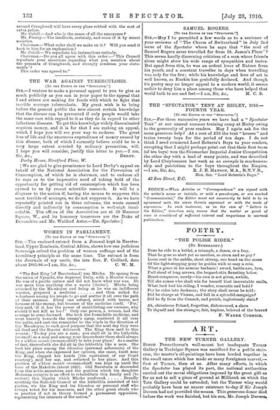WOMEN IN PARLIAMENT.
[To ma EDITOR OP T1111 "SPECTATOR."] Sin,—The enclosed extract from a Journal kept in Barotse- land, Upper Zambezia, Central Africa, shows how one judicious Sovereign solved the problem of woman suffrage and of the hereditary principle at the same time. The extract is from the Journals of my uncle, the late Rev. F. Coillard, date
about 1885-86.-4 am, Sir, &c., C. W. M.
"The first Bing [of Barotseland] was Mboho. He sprang from the union of Nyambe, the Supremo Deity, with a Morotsi woman. He was of a pacific nature and did not know what war was. He was more than anything else a ngaka [doctor]. Mboho being attacked by the Ma-nkoyas and being as he was an indifferent warrior, prepared a medicine and then called for volunteers among his people to go and scatter it all over the path cf their enemies. Every one refused, seized with terror, not because of the enemy, but because of the medicine itself. 'For,' they said, 'if it has the power of annihilating our enemies, why should it not kill us too?' Only one person, a woman, had the courage to come forward. She took the formidable medicine, and went bravely towards the enemy's camp, scattered it all over the paths, and cast the remainder to the winds in the direction of the Ma-nkoyas, to such good purpose that the next day they were all dead and the Barotsi delivered. The King then said to this woman: 'To-day you are a man; you shall sit in the lekhothla [council] as a HUM and among your descendants there shall always be a tekhosi mosali (woman-chief) to take your place.' As a matter of fact, thenceforth she did sit in the lekhothla like a man. She took her place among the likomboa (personal adherents) of tho King, and when she expressed her opinion, she came, knelt near the King, clapped her hands [the equivalent of our Court courtesy], said her say, and returned to her place. And this position of n'khosi mosali (woman-chief) was kept up until the time of the Makololo (about 1829). Old Narubutn is descended from this noble ancestress, and the position which his daughter Mahoana occupies is an effort to rehabilitate this family and [to restore] this dignity which Mboho conferred Broadly speaking the National Council at the lekhothla consisted of two parties, viz. the King and his likomboa or personal staff who always voted for his measures, and the other great chiefs who in practice if not in theory formed a permanent opposition, representing the interests of the nation."






































 Previous page
Previous page